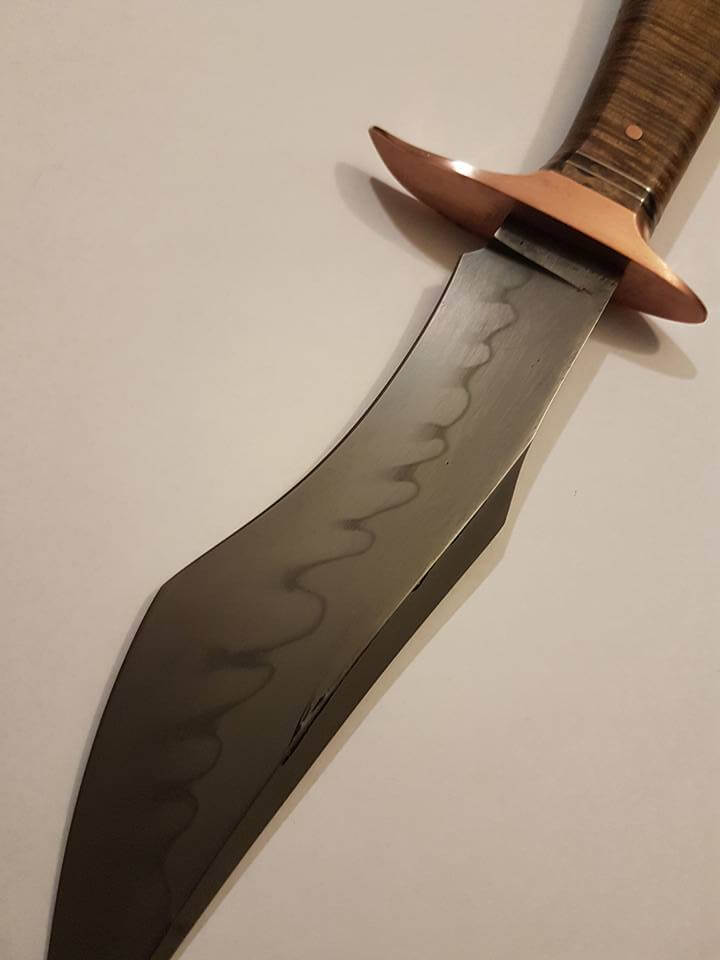Description
Heat Treat Recipe for Hamon using W2
Recipe copied from AustralianBladeForums.com.au, post by Shawn McIntyre, original text from John White.
Only work I have done is convert from Fahrenheit to Celcius and add a summary for clarity.
Summary: How to get a hamon
- Creating a hamon consists of missing the heat treat so elegantly that the blade hardens and the spine does not. The line between hitting and missing the complete hardening is what creates the visible hamon line. Note therefore that the below is a starting point only, your equipment and temperature control will decide the exact point you can elegantly “miss” hardening the entire blade.
- If forging, forge W2 between 760-1038 C (1400-1900 F), do not forge below 760 C (1400 F) or dull red colour.
- Normalise 4 times by heating to the below temperature and air cooling to at least black (no visible heat) atAnnealing: Hold at 649 C (1200 F) for 1 hour, air cool to room temperature for complete annealing.
- 1st cycle: heat to 871 C (1600 F) and air cool to room temperature
- 2nd cycle: heat to 802 C (1475 F) and air cool to at least black heat (427 C / 800 F)
- 3rd cycle: heat to 788 C (1450 F) and air cool to at least black heat
- 4rd cycle: heat to 774 C (1425 F) and air cool to at least black heat
- Grinding: (Start here if not forging to shape) Grind as normal, leaving edge 1 mm or slightly less (0.04”)
- Stress-relieve: Another annealing cycle by holding at 649 C (1200 F) for 1 hour, air cool to room temperature
- Clay
- The clay is an insulator, keeping heat in the back of the blade, stopping hardening from happening
- Mix Satanite mixed with water to a thin mud consistency
- Apply 1.5 mm or less of clay (1/16”) to a clean, de-oiled blade to back of blade only
- No need to dry, straight into forge for heat up
- Heat treatment temperature W2: 774 C – 802 C (1425 – 1475 F)
- Lower temp will produce better hamon as long as successful
- Too low temp: blade will not harden.
- Too high temp: entire blade hardens (so no hamon)
- John W uses 783 C (1440 F)
- Quench medium:
- Fast quench oil such as Parks 50
- Water if no fast quench oil available, but larger chance of blade failure
- Canola oil is an option, but may be too slow to stop the back from hardening (so little or no hamon)
- Quench technique:
- Heat blade to 783 C (1440 F), hold for 5-8 min
- Quench tip first into fast quench oil, preheated to 30-40 C (95 F)
- In for 3 seconds, out of the oil for 3 seconds, then back in for 8-10 seconds
- Tempering:
- Clean blade of clay, sand to shiny if wanting to see tempering colours
- Temper twice x 2 hours at 232 C (450 F) for 58-59 HRC
- Final grinding as normal, prepare for etching
- Hand sand to 1500 grit
- Etching
- Ferric Chloride (ebay) mixed with water 1 part FC to 4 parts water
- Wash blade very well, wear rubber gloves, eye protection, no scratches or fingerprints on blade left
- Etch for about 8 seconds, spray with Windex to neutralize so the etching stops while rubbing off the oxide layer. Clean off oxides with Flitz (metal polish product, similar to Autosol) on a piece of a flannel shirt.
- Depending on how complex the hamon looks, use 4 to 12 etch cycles. The more “ashi” or wisps below the hamon line there seems to be, the more value from more etching cycles.
- Wash blade well
- Polish
- Polish with 1500 grit silicon carbide powder (off ebay) using make-up removal pads and Ballistol for lubricant (Bunnings has Ballistol oil, described as a lubricant and rust-protector)
- Polish until hamon seems to no longer change
Brilliant example of a hamon in W2 made by Shane Partridge in Wollongong (Blacks Blades, check out his work on Facebook)











